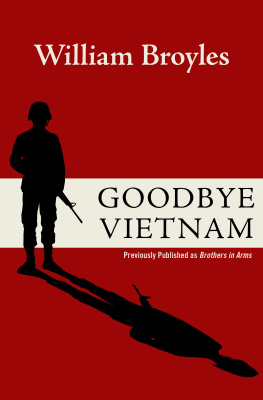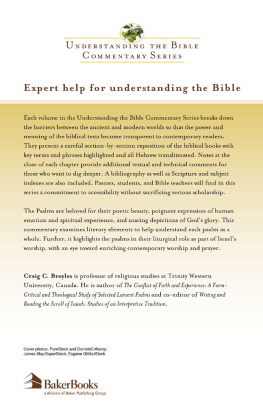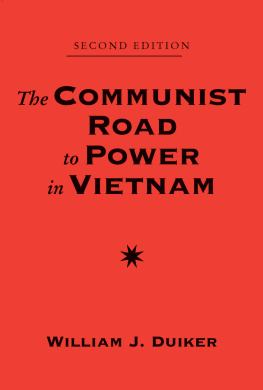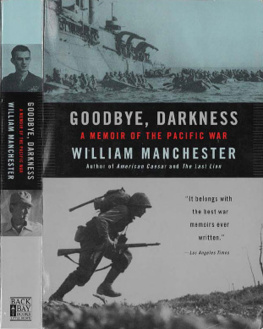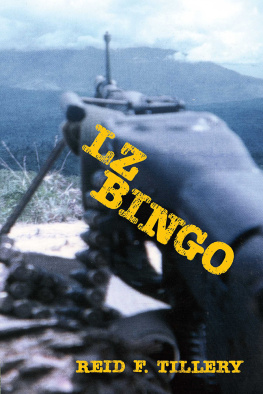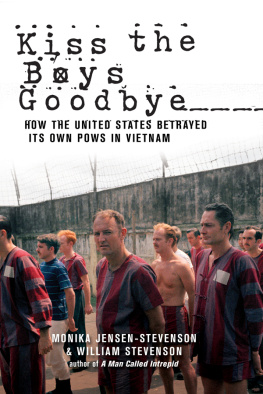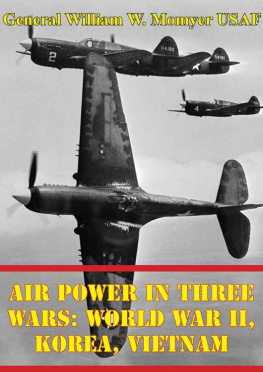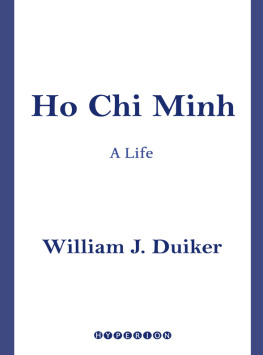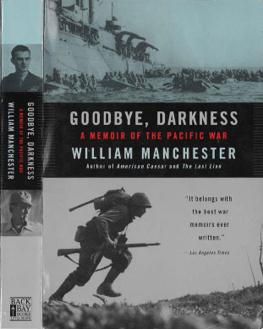William Broyles - Goodbye Vietnam
Here you can read online William Broyles - Goodbye Vietnam full text of the book (entire story) in english for free. Download pdf and epub, get meaning, cover and reviews about this ebook. year: 2013, publisher: Open Road Media, genre: Non-fiction. Description of the work, (preface) as well as reviews are available. Best literature library LitArk.com created for fans of good reading and offers a wide selection of genres:
Romance novel
Science fiction
Adventure
Detective
Science
History
Home and family
Prose
Art
Politics
Computer
Non-fiction
Religion
Business
Children
Humor
Choose a favorite category and find really read worthwhile books. Enjoy immersion in the world of imagination, feel the emotions of the characters or learn something new for yourself, make an fascinating discovery.
- Book:Goodbye Vietnam
- Author:
- Publisher:Open Road Media
- Genre:
- Year:2013
- Rating:4 / 5
- Favourites:Add to favourites
- Your mark:
- 80
- 1
- 2
- 3
- 4
- 5
Goodbye Vietnam: summary, description and annotation
We offer to read an annotation, description, summary or preface (depends on what the author of the book "Goodbye Vietnam" wrote himself). If you haven't found the necessary information about the book — write in the comments, we will try to find it.
Goodbye Vietnam — read online for free the complete book (whole text) full work
Below is the text of the book, divided by pages. System saving the place of the last page read, allows you to conveniently read the book "Goodbye Vietnam" online for free, without having to search again every time where you left off. Put a bookmark, and you can go to the page where you finished reading at any time.
Font size:
Interval:
Bookmark:



Find a full list of our authors and
titles at www.openroadmedia.com
FOLLOW US:





GOODBYE VIETNAM
A JOURNEY FROM WAR TO PEACE
WILLIAM BROYLES

Southwestern Writers Collection Series
The Southwestern Writers Collection Series originates from the Southwestern Writers Collection, an archive and literary center established at Southwest Texas State University to celebrate the regions writers and literary heritage.
All rights reserved under International and Pan-American Copyright Conventions. By payment of the required fees, you have been granted the non-exclusive, non-transferable right to access and read the text of this ebook onscreen. No part of this text may be reproduced, transmitted, downloaded, decompiled, reverse engineered, or stored in or introduced into any information storage and retrieval system, in any form or by any means, whether electronic or mechanical, now known or hereinafter invented, without the express written permission of the publisher.
Copyright 1986 by William Broyles
Maps copyright 1986 by David Lindroth
Portions of this book appeared, in a different form, in The Atlantic, Esquire, and Newsweek.
ISBN: 978-1-4804-0433-5
This edition distributed in 2013 by Open Road Integrated Media
180 Maiden Lane
New York, NY 10038
www.openroadmedia.com

This book is the story of a journey in search of some basic truths about war and peace, and why love and laughter thrive so near to death. It is part memoir, part narrative, part history. Almost twenty years have passed since I began, and a good many people helped me along the way. I am grateful to them all, and offer the excuse of a poor memory to anyone whose contributions I fail to acknowledge.
Many veterans of the Vietnam War helped in different ways in the course of my writing this book, among them Tom Bird, Charles Clements, Bernard Edelman, Arthur Egendorf, Jack Fuller, Winston Groom, Robert Kerrey, Robert Muller, Robert Nylen, Tim OBrien, Al Santoli, Robert Santos, Tom Tomasiewicz, James Webb, John Wheeler III, and General William C. Westmoreland. Several of them have written their own books, and most would probably disagree with at least some of what appears in this one. No matter. All of us were there.
James Fallows and Paul Burka read the entire manuscript and made valuable suggestions throughout. I also received useful comments from Andrew Cockburn, James Dingeman, John Gregory Dunne, Peter Goldman, Harry Hurt III, Nima Isham, Jonathan Kirsch, Nicholas Lemann, Jan Lodal, Allen Matusow, Terry McDonell, Al Reinert, William Shawcross, and Meredith White, as well as from Kurt Vonnegut, who shared with me some reminiscences of World War II.
William Whitworth, Jack Beatty, and Sue Parilla of The Atlantic contributed editorial insight to portions of the book, as did Lee Eisenberg and David Hirshey of Esquire. At Alfred Knopf, Bob Gottlieb was an inspiration in shaping the manuscript, and Mel Rosenthal and Mary Maguire gave me much assistance. My agent, Lynn Nesbit, always seemed to see the light at the end of the tunnel, even when I could not.
Ted Slate of the Newsweek library gave me research help, and Frank Gibney, Jr., of Newsweeks Bangkok bureau came to my rescue on more than one occasion. Retired Brigadier General Edwin Simmons made available the resources of the Marine Corps Historical Center in Washington, D.C., where Jack Shulimson and Colonel John Miller were generous with their time and knowledge.
I could not have made my return journey to Vietnam in 1984 without the many Vietnamese who persuaded their unfathomable bureaucracy to allow my unorthodox itinerary, and who gave me invaluable aid along the way. I owe special thanks to Tran Trong Khanh in New York City, Duong Minh and Nguyen Van Thuan in Hanoi, Tran Hien in Da Nang, and Nguyen Phuong Nam and Tran Van Viet in Saigon. Le Luong Minh traveled with me the length and breadth of Vietnam, never losing his patience or his good humor as he helped me see what has become of his country. Many other men and women helped me inside Vietnam, some at considerable risk to themselves. It would not be prudent to mention their names, but I have not forgotten them.
Among the international community in Hanoi and Saigon, several people were particularly generous, among them Michael Flaks of the International Committee for the Red Cross, Wendy and Michael Wood of the British Embassy, Catherine von Heidenstam of the Swedish Embassy, and Charles De Nerciat of Agence France Presse and his wife, Mary Sun.
As my radioman during the war, Jeff Hiers kept me alive. During the writing of this book his flawless memory, irreverent humor, and constant encouragement kept me going.
I have only begun to understand how much Vietnam affected my family. While I was in the war, my parents and my sister suffered the daily pain and uncertainty, the fear of the telephone call late at night, that is a part of staying behind. This book is a small way of thanking them for their support through that year, and throughout my life.
My wife Sybils good judgment, clear thinking, and visual imagination improved each page of this book, just as her love and patience made it possible. For the past two years she and my children have had the double burden of living with both an old soldier and a writer. They deserved better, but then again, so did we all.
W.B.
This book is based on two journeys I made to Vietnam, one in war, the other in peace. The first was in 1969, when I spent a year there as a young Marine Corps lieutenant during the war. When I returned in 1984, the country where I had fought had vanished. Only my memories of it remained, fixed and immutable, or so I thought. Since then Vietnam has changed even more, but it still has a troubling, powerful pull on our memories and on our foreign policy. We lost something there. Brothers in Arms grew from my quest to go back and find it.
When I first saw Vietnam I was immediately drunk on the green strange savage sweetness of it. I was leading a platoon of marines, which meant I saw the country with my face in the mud, struggling with fear, desperately trying to be worthy of the teenage Americans under my command. I lay in the jungles in the black fecund Asian night, watching astronauts streak by in the sky high above me. They knew more about the moon than I knew about this mysterious land where we wandered about, clinging to our ideals and our weapons, utterly lost. We were young and scared and we gave each other everything we had.
Font size:
Interval:
Bookmark:
Similar books «Goodbye Vietnam»
Look at similar books to Goodbye Vietnam. We have selected literature similar in name and meaning in the hope of providing readers with more options to find new, interesting, not yet read works.
Discussion, reviews of the book Goodbye Vietnam and just readers' own opinions. Leave your comments, write what you think about the work, its meaning or the main characters. Specify what exactly you liked and what you didn't like, and why you think so.

